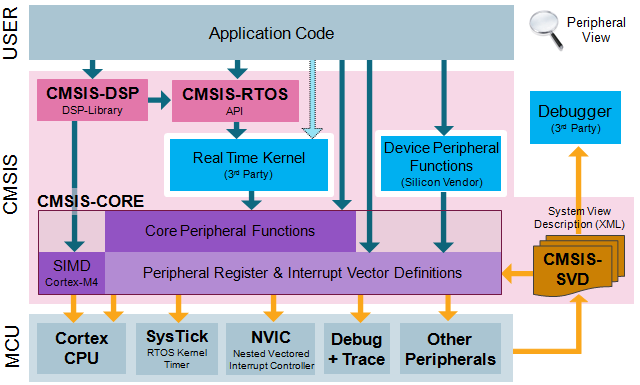The Cortex Microcontroller Software Interface Standard (CMSIS) is a vendor-independent hardware abstraction layer for the Cortex-M processor series. The CMSIS enables consistent and simple software interfaces to the processor and the peripherals, simplifying software re-use, reducing the learning curve for microcontroller developers, and reducing the time to market for new devices.
The CMSIS is defined in close cooperation with various silicon and software vendors and provides a common approach to interface to peripherals, real-time operating systems, and middleware components. The CMSIS is intended to enable the combination of software components from multiple middleware vendors.
The CMSIS components are:
- CMSIS-CORE: API for the Cortex-M processor core and peripherals. It provides at standardized interface for Cortex-M0, Cortex-M3, Cortex-M4, SC000, and SC300. Included are also SIMD intrinsic functions for Cortex-M4 SIMD instructions.
- CMSIS-DSP: DSP Library Collection with over 60 Functions for various data types: fix-point (fractional q7, q15, q31) and single precision floating-point (32-bit). The library is available for Cortex-M0, Cortex-M3, and Cortex-M4. The Cortex-M4 implementation is optimized for the SIMD instruction set.
- CMSIS-RTOS API: Common API for Real-Time operating systems. It provides a standardized programming interface that is portable to many RTOS and enables therefore software templates, middleware, libraries, and other components that can work acrosss supported the RTOS systems.
- CMSIS-SVD: System View Description for Peripherals. Describes the peripherals of a device in an XML file and can be used to create peripheral awareness in debuggers or header files with peripheral register and interrupt definitions.

CMSIS Structure
Motivation
CMSIS has been created to help the industry in standardization. It is not a huge software layer that introduces overhead and does not define standard peripherals. The silicon industry can therefore support the wide variations of Cortex-M processor-based devices with this common standard. In detail the benefits of the CMSIS are:
- Consistent software interfaces improve the software portability and re-usability. Generic software libraries can interface with device libraries from various silicon vendors.
- Reduces the learning curve, development costs, and time-to-market. Developers can write software quicker through an easy to use and standardized software interface.
- Provides a compiler independent layer that allows using different compilers. CMSIS is supported by all mainstream compilers (ARMCC, IAR, and GNU).
- Enhances program debugging with peripheral information for debuggers and ITM channels for printf-style output and RTOS kernel awareness.
Coding Rules
The CMSIS uses the following essential coding rules and conventions:
- Compliant with ANSI C and C++.
- Uses ANSI C standard data types defined in <stdint.h>.
- Variables and parameters have a complete data type.
- Expressions for #define constants are enclosed in parenthesis.
- Conforms to MISRA 2004. MIRSA rule violations are documented.
In addition, the CMSIS recommends the following conventions for identifiers:
- CAPITAL names to identify Core Registers, Peripheral Registers, and CPU Instructions.
- CamelCase names to identify function names and interrupt functions.
- Namespace_ prefixes avoid clashes with user identifiers and provide functional groups (i.e. for peripherals, RTOS, or DSP Library).
The CMSIS is documented within the source files with:
- Comments that use the C or C++ style.
- Doxygen compliant function comments that provide:
- brief function overview.
- detailed description of the function.
- detailed parameter explanation.
- detailed information about return values.
Doxygen comment example:
/**
* @brief Enable Interrupt in NVIC Interrupt Controller
* @param IRQn interrupt number that specifies the interrupt
* @return none.
* Enable the specified interrupt in the NVIC Interrupt Controller.
* Other settings of the interrupt such as priority are not affected.
*/
Licence
The CMSIS is provided free of charge by ARM and can be used for all Cortex-M based devices. View the LICENCE AGREEMENT for CMSIS in detail.


